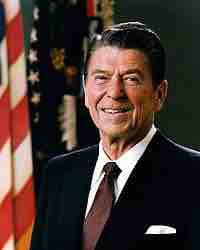The term "devolution revolution" came from the Reagan ideology and is associated with New Federalism. New Federalism, which is characterized by a gradual return of power to the states, was initiated by President Ronald Reagan (1981–1989) with his "devolution revolution" in the early 1980s, and lasted until 2001. The primary objective of New Federalism, unlike that of the eighteenth-century political philosophy of Federalism, is the restoration to the states of some of the autonomy and power that they lost to the federal government as a consequence of President Franklin Roosevelt's New Deal. Previously, the federal government had granted money to the states categorically, limiting the states to use this funding for specific programs. Reagan's administration, however, introduced a practice of giving block grants, freeing state governments to spend the money at their own discretion.

Ronald Reagan
The devolution revolution was an ideology supported by Ronald Reagan.
New Federalism is sometimes called "states' rights," which is a theory in U.S. politics that refers to political powers reserved for the U.S. state governments rather than the federal government. Its proponents usually eschew the idea of states' rights because of its associations with Jim Crow laws and segregation. Unlike the states' rights movement of the mid-20th century which centered around the civil rights movement, the modern federalist movement is concerned far more with expansive interpretations of the Commerce Clause, as in the areas of medical marijuana (Gonzalez v. Raich), partial birth abortion (Gonzalez v. Carhart), gun possession (United States v. Lopez), federal police powers (United States v. Morrison, which struck down portions of the Violence Against Women Act), or agriculture (Wickard v. Filburn). President Bill Clinton (1993–2001) embraced this philosophy, and President George W. Bush (2001–2009) appeared to support it at the time of his inauguration.